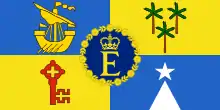Flags of Elizabeth II
Queen Elizabeth II has and has had a variety of flags to represent her personally and as head of state of 16 independent nations around the world. They are usually used on any building, ship, car, or aircraft where she is present.
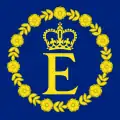
These heraldic flags are usually a nation's coat of arms in banner form.
Princess Elizabeth and Duchess of Edinburgh
Princess Elizabeth's personal standard prior to her accession as queen was her coat of arms in banner form. This consisted of four quarters consisting of three lions passant for England, a lion rampant for Scotland, and a Gaelic harp for Ireland. To differentiate the arms of Princess Elizabeth from that of the King it was differenced with a white label of three points, the centre point bearing a Tudor rose and the first and third a cross of St George.
.svg.png.webp) 1944–1952
1944–1952_(1944-1952).svg.png.webp) Scottish version
Scottish version
United Kingdom
Upon the death of her father, Princess Elizabeth became Queen Elizabeth II and therefore adopted the Royal Standard. This flag is used to represent the Queen not only in the United Kingdom but also overseas when she makes state visits. It is the royal arms in banner form undifferentiated.
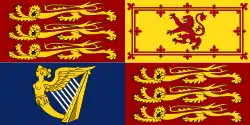 Outside Scotland
Outside Scotland.svg.png.webp) Scotland
Scotland
Personal flag
.svg.png.webp)
The Royal Household may display Queen Elizabeth II's personal flag on any building, ship, car, or aircraft in which she is staying or travelling.[1] It often represents Her Majesty in her role as Head of the Commonwealth or as monarch of a Commonwealth realm in which she does not possess a unique flag.[1] This flag, designed in the College of Arms in 1960, was first used in 1961 for the Queen's visit to India.[2]
The flag bears the crowned letter E in gold, surrounded by a garland of gold roses on a blue background, with a golden fringe.[3] The crown is a symbol of the Queen's rank and dignity, whilst the roses symbolise the 53 countries of the Commonwealth. (The "crowned 'E'" emblem also appears in the Queen's personal flags for Australia, Barbados, Jamaica, Canada, and New Zealand.)
The flag was created at the Queen's request in December 1960 to symbolise her as an individual, not associated with her role as sovereign of any particular Commonwealth realm.
Over time, the flag started to be used in place of the British royal standard when the Queen visits Commonwealth countries where she is not head of state and for Commonwealth occasions in the United Kingdom; it came to symbolise the Queen as Head of the Commonwealth. Eventually, the practice evolved wherein the flag is raised at Marlborough House (the headquarters of the Commonwealth Secretariat) in London when the Queen visits, rather than the Royal Standard of the United Kingdom.[4]
Commonwealth realms
Since the 1960s, flags have been introduced to represent the Queen in various Commonwealth realms. These flags have followed the same basic pattern: the nation's coat of arms in banner form with the device found on her personal flag. These flags are only used by the Queen when she is in their respective countries. The Queen's representatives in these nations have their own flags to represent them.
See also
References
- "Personal flags". Royal household. Retrieved 4 December 2013.
- "British Royal Flags, Reign of Elizabeth II: Personal Flags of Queen Elizabeth II". Flags Of The World.
-
Compare:
Canada and the World. 1960. Retrieved 13 June 2018.
Queen Elizabeth II has adopted a personal flag in addition to the Royal Standard. [...] The flag was designed in the College of Arms under the personal direction of the Garter King of Arms, Sir George Bellow. It consists of the letter 'E' ensigned with the royal crown, the whole within a chaplet of roses, all in gold on a blue field.
- "Mailbox". Royal Insight. September 2006. p. 3. Archived from the original on 19 November 2008.
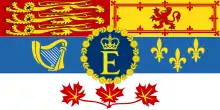
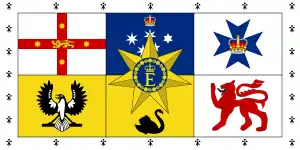
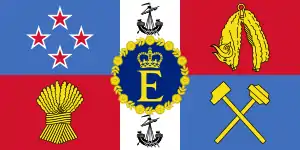
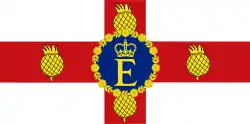
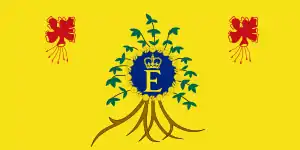
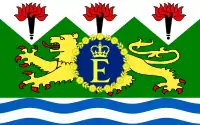
.svg.png.webp)
.svg.png.webp)
